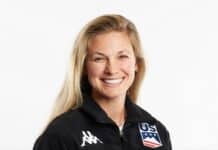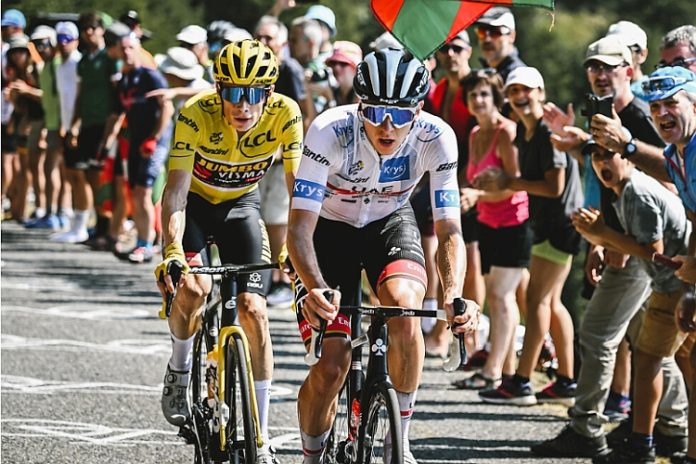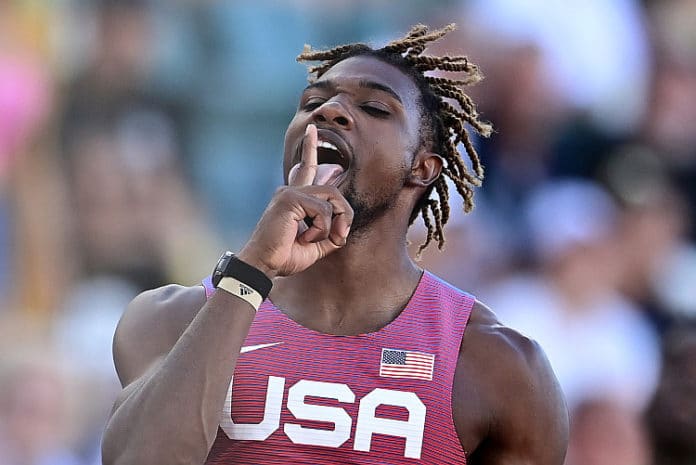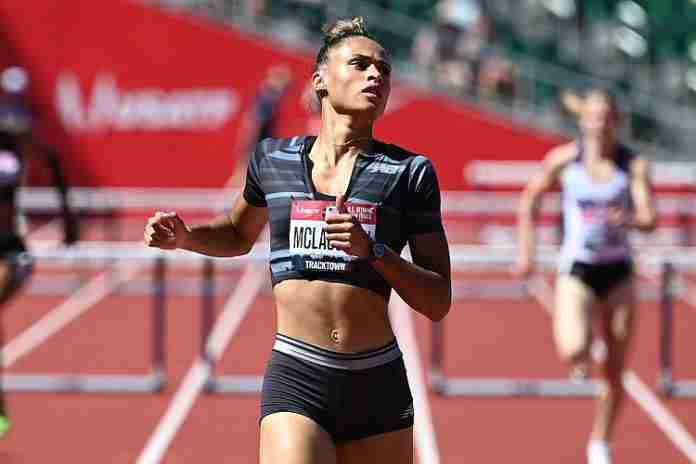★ The Sports Examiner: Surveying, monitoring and explaining the key competitive, economic and political forces shaping elite sport and the Olympic Movement. This site is free to view, with donations gratefully accepted to support our operating costs.
Comments? Click here. ★
★ Get The Sports Examiner’s session-by-session Worlds e-mails; sign up here! ★
≡ THE 5-RING CIRCUS ≡
1. Doubt expressed on 2030 Vancouver bid, but it’s still alive
2. Russian sports minister: no need to challenge Olympics?
3. Vingegaard all but clinches Tour de France win
4. Devon Allen consistently the quickest starter
5. Rare insight into costs of elite sailing
Concern over the details of a Vancouver bid for the 2030 Olympic Winter Games were laid out by city staff on Wednesday over familiar issues of governance, money and risk, with little time remaining to work things out. But the City Council voted to keep going. In Russia, the sports minister said there were no plans to offer new competitions as alternatives to the Olympic Games. In France, Jonas Vingegaard won Stage 18 and has essentially wrapped the first Tour de France win by a Danish rider in 56 years. At the World Athletics Championships, three false-start disqualifications have roiled fans, but American Devon Allen was a known fast starter who got no break from officials. And it costs a lot of money to outfit and enter a boat in the 2022 49erFX (Olympic) class World Championship; a U.S. duo is raising money online.
(Errata: Some readers saw a version of last night’s post on the World Athletics Championships with a typo. Noah Lyles’s winning time of 19.31 makes him the no. 3 performer in history, with the no. 4 performance ever. Only Jamaicans Usain Bolt (19.19 and 19.30) and Yohan Blake (19.26) have ever run faster. Shericka Jackson‘s winning time in the women’s 200 m was rounded down from 21.46 to 21.45.)
1.
Doubt expressed on 2030 Vancouver bid, but it’s still alive
A 47-page report delivered Wednesday by Vancouver City Manager Karen Levitt expressed significant doubts on the ability of the region to compile and submit a quality bid for the 2030 Olympic Winter Games on the reported timeline preferred by the International Olympic Committee.
The staff report identifies significant concerns over multiple areas, starting with formal approval of the bid from the four First Nations designated to lead the effort. Then there are issues of money and risk:
● “The proposed financial, indemnification and governance model for the Games is not yet known. The Province of BC has stated that the municipalities and First Nations should not assume that the Province will be responsible for the cost of services and/or risks incurred, and that their participation in a bid would be contingent upon a commitment to share the costs and risks of hosting the 2030 Winter Games by each of the municipal and First Nation bid participants, stated publicly by mid-August 2022.”
● “The federal government as a matter of policy does not indemnify international sporting events. The Province of BC has stated that the municipalities and First Nations involved in the bid should not assume that the Province will be responsible for indemnities. The absence of a clear senior government commitment to indemnify the event represents a material difference in context for Vancouver, relative to the 2010 Games. Given the magnitude of the potential liability, it would not be feasible for the City to sign on as Host City for the 2030 Winter Games without being appropriately indemnified.”
● “The timeline for the [Canadian Olympic Committee] to submit a BC bid with Vancouver as an official Host City is extremely compressed, and it is staff’s view that there is insufficient time for the requisite work to be done by staff to evaluate the potential benefits, costs and risks to the City, and to negotiate the necessary legal agreements by the COC’s deadline of December 2022.”
In other words, it’s getting late, and the City staff is not sure it has the resources to pull things together in time: “It is the view of staff that the proposed timeline to submit a bid as currently constituted is not achievable.”
Moreover, the question of who is ultimately responsible to pay for the Games is not resolved, and the City staff do not recommend assuming “unlimited financial risk” to put on the event. A comprehensive agreement to bid for (and stage) a 2030 Winter Games likely has 12 signatories, including First Nations, three levels of governments and the Canadian Olympic and Paralympic Committees.
Canadian Olympic Committee President Tricia Smith noted that the 2030 Games is a better fit for Vancouver since the cost to refurbish the venues for 2034 will cost more. The GamesBids.com site reported:
“The COC feasibility team hopes to get First Nation stakeholders to back the project in August leading to a multiparty agreement by November and meeting a proposed IOC deadline. But standing in the way are October 15 municipal elections across British Columbia that could change the face, and minds, of Vancouver city council. Only weeks would be available for the council and staff to move forward with important negotiations and decision making.”
On Wednesday, the Vancouver City Council voted 8-2 to continue the bid development process, with the urging of the four First Nations, the city of Whistler and the Canadian Olympic Committee. The Council also rejected, by 10-1, a request for a public referendum on the bid in October, again suggested by Council member Colleen Hardwick, who has floated this idea before.
2.
Russian sports minister: no need to challenge Olympics?
Russian sports minister Oleg Matytsin told reporters on Thursday that he does not see the new Friendship Games as a challenge to the Olympic Movement:
“We are ready to develop in any format, today I do not see the need to create alternative games.
“We have enough formats – these are the BRICS, [Shanghai Cooperation Organization], [Commonwealth of Independent States] countries to enable our athletes not to lose the feeling of a competitive environment. Time will tell, I hope that it will triumph reason in international federations, in the International Olympic Committee.
“Without Russia, the development of world sports is impossible, depriving athletes of the right to participate in the Olympic Games will be a crime and will only lead to greater discord within the Olympic Movement.”
Speaking at the opening of the new Friendship Games in Kazan, Matytsin explained:
“Friendship is not calculated in money, we have sufficient financial potential to hold the largest competitions in Russia. This is the position of both the President of Russia and the government. Financing is important, but happiness is not only in money.
“Today we see that Kazan has the potential, we are planning to host these games here. I see no obstacles for them to be held every year. We hope that this will not disrupt the international calendar and will become an additional incentive for athletes.”
The Friendship Games as held in 2022 will take place in three stages through December and include only aquatic sports: swimming, diving and artistic. TASS reported that “more than 1,300 athletes from 16 countries will perform in Kazan as part of the Friendship Games: Russia, Algeria, Armenia, Belarus, Venezuela, Vietnam, Serbia, Kazakhstan, Syria, Sudan, Tajikistan, Uzbekistan, Ecuador, South Africa, [Donetsk People’s Republic] and [Luhansk People’s Republic].”
The Donetsk and Luhansk “republics” are territories taken from Ukraine in the current invasion.
3.
Vingegaard all but clinches Tour de France win
In the second straight day of one-on-one competition between the two contenders for the 109th Tour de France, it was Denmark’s Jonas Vingegaard who – barring a disaster – essentially clinched victory on the final climbing stage on Thursday.
Stage 18 was the last day in the Pyrenees and the 143.2 km route included two major climbs and then an uphill finish on the Hautacam ski resort. Two-time defending champion Tadej Pogacar (SLO) was all-out to break Vingegaard and wipe out most of the 2:18 deficit at the start of the day.
But despite attack after attack, Vingegaard was right on Pogacar’s wheel, and then, in a remarkable display of sportsmanship, slowed to allow Pogacar to catch up after he slid off the road on a graveled section on the furious descent after the second climb, on the Col de Spandelles. Once together again, they dueled together and finally caught the front-runner, Belgian star Wout van Aert, a teammate of Vingegaard on the Dutch Jumbo-Visma team.
Van Aert had been leading over the final climb, but was caught by Pogacar and Vingegaard with about 5 km left, on the final ascent. At this point, he was helping his teammate and with 4 km to go, Pogacar broke. Van Aert eased back into third (+2:10) and Vingegaard steamed to the finish with a 1:04 win over Pogacar in 3:59:50 and took a seemingly insurmountable 3:26 lead into the final three stages.
Pogacar is a solid second, with 2018 winner Geraint Thomas (GBR) third, but 8:00 back of the leader. Vingegaard was second last year and a win in 2022 would be the first for a Dane since 1996.
The remaining stages are fairly flat, but with a dangerous, 40.7 km time trial on Saturday. But Vingegaard would have to be injured now to lose, and he shows no signs of slowing.
4.
Devon Allen consistently the quickest starter
One of the discussion points of the 2022 World Athletics Championships will be the current rules for false starts. Three disqualifications stand out already as controversies:
● Women/100 m semifinals: Julien Alfred (LCA) in semi one, starting in 0.095 seconds.
● Women/100 m semifinals: Tynia Gaither (BAH) in semi three, starting in 0.093 seconds.
● Men/110 m Hurdles final: Devon Allen (USA), starting in 0.099 seconds.
The rules say that any start faster than 1/10th of a second (0.10 seconds) is suspect and subject to disqualification. And all three were; no discretion was shown to these three athletes.
NAL Athletics coach George Perry compiled some revealing data from 10 Diamond League meets from 2017-19, eight U.S. indoor and outdoor championship meets (as available) and four NCAA Championships between 2016-22 on sprinters and hurdlers who started fastest on average (minimum 10 races):
● 0.138 seconds: Devon Allen (USA/hurdles)
● 0.145 seconds: Tonea Marshall (USA/hurdles)
● 0.151 seconds: Mike Rodgers (USA/sprints)
● 0.151 seconds: English Gardner (USA/sprints)
● 0.153 seconds: Andrew Hudson (JAM/sprints)
Moreover, Allen’s super-fast start really stands out. Of the 1,044 athletes in Perry’s study, only 38 had reactions of less than 0.12; Allen had four, three others had two and 34 had one each.
Under 0.15? There were 361 athletes who did that at least once; Allen did it 22 times! Next best were Ronald Levy (JAM/hurdles), Orlando Ortega (ESP/hurdles), Dafne Schippers (NED/sprints) and Marshall, with seven each.
All of this bodes well for Allen in his NFL career as a wide receiver for Philadelphia, since speed off the snap is critical. But he was too good in Eugene and the starter offered no dispensation to those who crossed below the 1/10th of a second line on the computer read-out.
Long-time Los Angeles-area coach Ron Brumel makes the case that these kinds of disqualifications “cheats not only the athletes, but PAYING fans who travel long distances at great expense to see great athletes run, not get dq’d for what may (or probably was not) a false start by .001 seconds, undetectable by the ‘naked eye’. “
World Athletics issued a statement that the block sensors and timing system were “functioning as normal” for the race and:
“The 0.1 sec threshold to measure a false start was established based on the science on standard reaction times. It is standard procedure after each world championships for the World Athletics Competition Commission to review the championships and recommend any rule changes.”
The false start rule was changed from one allowed against the field to none in 2010 after some athletes tried to game the one-free option. That rule might come back.
Allen is off to training camp, which begins next week. World Athletics’ competition director, the very capable Jakob Larsen (DEN), has another issue to deal with once the shouting is over in Eugene.
5.
Rare insight into costs of elite sailing
It costs money to compete at the world-class level in sailing and the American duo of Lucy Wilmot, 23, and Erika Reineke, 27, are raising funds to be able to sail at the upcoming World 49erFX Championships off Halifax, Nova Scotia beginning 31 August.
SailingScuttlebutt.com reported on a letter sent by the sailors, who are trying to raise $22,000 to get to the Worlds:
● $9,000 for mast and sail upgrades
● $8,000 for coaching fees
● $2,400 for housing
● $1,800 for boat transportation
● $500 for registration and entry fees
● $300 for food and incidentals
The GoFundMe page appeal includes: “We appreciate your encouragement and support up to this point and are thankful to have so many of you rooting for us! Now more than ever, we are asking for your help so we can represent the United States of America at this year’s World Championship.”
They are making some progress, raising $4,250 in the first day of asking. The 49erFX class debuted at the Rio 2016 Olympic Games as a women’s class for the two-person skiff and is a 16-foot-long, 207 lb., three-sail boat that can move at 25 miles an hour or more.
≡ PANORAMA ≡
● Athletics ● The women’s vault at the World Championships in Eugene was won by Olympic gold medalist Katie Nageotte of the U.S., with fellow American Sandi Morris second, both with a world-leading clearance of 4.85 m (15-11) on the 17th.
But Russian Anzhelika Sidorova – the defending champ from 2019, but currently banned – competed just a couple of days later at the coincidentally-timed Moscow Championships and claimed the world lead at 4.86 m (15-11 1/4). So there.
● Fencing ● Big day for Korea at the FIE World Fencing Championships in Cairo (EGY) with wins in the men’s Team Sabre and women’s Team Epee.
The Koreans were the Tokyo gold winners in Team Sabre and the same team – Bon-gil Gu, Sang-uk Oh, Jun-ho Kim and Jung-hwan Kim – defeated Hungary in the final, 45-42. The women’s Epee team – silver medalists at Tokyo 2020 – was led by individual gold medalist Se-ra Song and out-pointed Italy, 45-37.
● Figure Skating ● The International Skating Union announced that the sixth Grand Prix event for the 2022 season will take place in Sheffield (GBR). This completes the schedule, with the events in Russia and China replaced by Espoo (FIN) and Sheffield. Of the six “regular” Grand Prix events, two will be in North America, one in Asia and three in Europe. The Grand Prix Final will be in Turin (ITA).
¶
You can receive our exclusive TSX Report by e-mail by clicking here. You can also refer a friend by clicking here, and can donate here to keep this site going.
For our updated, 620-event International Sports Calendar for 2022 and beyond, by date and by sport, click here!




















